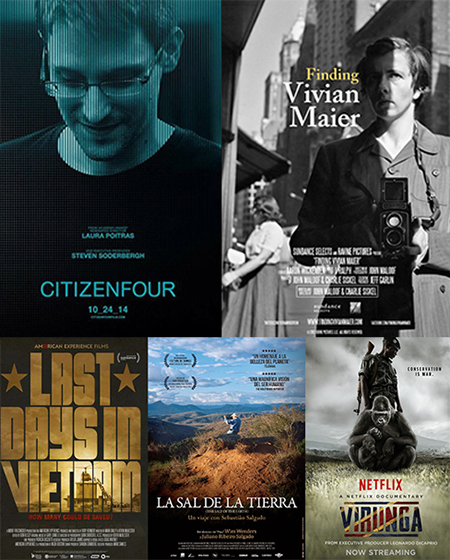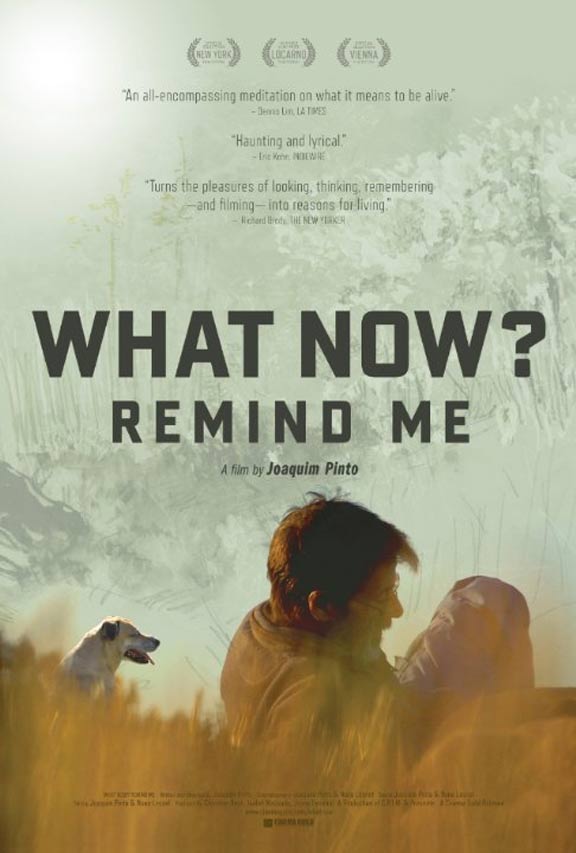Once one of the Academy's most frequently frustrating branches, voters for the Best Documentary Feature category have been on an impressive run lately. In the lead up to this year's Oscar ceremony, The Film Experience's Glenn Dunks is joined by Daniel Walber of Nonfics and Film School Rejects for a discussion on this year's nominees (and some that aren't). If you missed their discussion about 1989's Common Threads then make sure you do and join us Tuesday for part two of this look at the doc class of 2014.

Glenn: Welcome back to The Film Experience, Daniel. Before we get into the individual films, I thought I’d ask how you thought 2014 stood up for the documentary form and whether the Academy’s did a good job of encapsulating the year with their nominations. I don’t see anywhere near as many docs as you do so correct me if my reading of the year in non-fiction is off, but I do think this year’s Oscar line-up did a good job of representing the year in documentary: solid, but not truly exceptional. Certainly, some of the best doc’s we saw weren’t even eligible so it was impossible they would show up – like, for instance, both of Team Experience’s best unreleased films, The Look of Silence and Silvered Water: Syria Self Portrait – but it was always going to be tough to beat 2013’s all-time great nomination list.
 Daniel: Last year was certainly quite something. I wouldn’t necessarily say that 2013 was a much better year for documentaries in general, but rather that the top films were harder for the Academy to ignore. I don’t think anyone thought of The Act of Killing as a contender at first, but the overwhelming critical acclaim made the difference. Most of my favorites of 2014 were a little further from the Oscar radar. [More...]
Daniel: Last year was certainly quite something. I wouldn’t necessarily say that 2013 was a much better year for documentaries in general, but rather that the top films were harder for the Academy to ignore. I don’t think anyone thought of The Act of Killing as a contender at first, but the overwhelming critical acclaim made the difference. Most of my favorites of 2014 were a little further from the Oscar radar. [More...]
What Now? Remind Me (Jose's Review) for my money the best film of the year, wasn’t eligible. Other great work didn’t make the shortlist, including Rich Hill and National Gallery (not that Frederick Wiseman ever grabs the Academy’s attention). I also had plenty of hope for The Overnighters (Amir's Review) which just missed. This year’s slate of nominees feels a bit more formally conservative, on par with the good-but-not-great batch from 2011.
Glenn: Well speaking of formally conservative, I must admit to being somewhat surprised at the inclusion of Finding Vivian Maier in the Academy’s list. I shouldn’t have been surprised given it was the highest grossing doc of the year (until Citizenfour came along), but something about John Maloof and Charlie Siskel’s doc struck me as a little too “Tonight on 60 Minutes – who is this mysterious photographer speaking from beyond the grave?”
In fact, 60 Minutes was where I first heard Maier and Maloof’s story so I guess it's appropriate! It’s a solid film, and certainly one that benefits from its subjects prior anonymity, allowing audiences to discover who Vivian Maier was and get them invested in her plight. Allowing the audience to be on the same page as the filmmaker is a valuable asset. Also: Phil Donahue!
It’s more than can be said for the increasingly frustrating The Salt of the Earth. What did you think of these two photo docs?
Daniel: I am certainly beginning to wonder about the difficulty inherent in making a documentary about photography. It’s hard to make a sequence of still images really pop. Finding Vivien Maier has faced some harsh criticism because Maloof foregrounds his own story of discovering Maier, rather than simply showing her work. The problem with that argument is that the alternative, removing the “finding” narrative and focusing on the photographs, might deaden the elements that make Finding Vivien Maier a success as a movie. The worst photography documentaries are little more than moving coffee table books. The best of them (like Jennifer Baichwal’s Manufactured Landscapes) offer something more.
 Sebastião Salgado's famous gold mine series
Sebastião Salgado's famous gold mine series
Unfortunately, Wim Wenders’s The Salt of the Earth doesn’t offer much of anything. Sebastião Salgado is evidently an excellent photographer, but the film doesn’t really bring that to life. It’s boring, both visually and narratively, and uses black and white cinematography almost as a crutch. It also often verges on the pedantic. Most of Salgado’s career has been spent taking portraits of the world’s less fortunate, people in troubled regions of Africa, South America and beyond. This film could have been an opportunity to delve behind Salgado’s silent photographs, but Wenders has no interest in the speech of anyone but Salgado, his family, and Wenders himself. It’s immensely frustrating.
You’re no fan of the film either, I believe.
Glenn: No, I am not. Wim Wenders has made great documentaries in the past (Pina for instance), but this feels like the equivalent of Meryl Streep in the acting categories. Just because he made something, doesn’t mean it should be nominated. I found Salt of the Earth’s storytelling rather limply handled and with potentially interesting visual concepts not utilized in the best way. Plus, I found Sebastião Salgado thoroughly less interesting than the subject matter of his photography. Subject matter that, as you say, we don’t get any insight into beyond Salgado's voice, who is far from the most reliable source.
I didn’t have that problem with Virunga, which presents its third world story through the eyes of those who actually live there and are involved in it rather than the western interloper. Speaking of surprising nominations, I figured after the likes of Project Nim and Blackfish failed to garner nominations that animal activism just wasn’t their thing anymore. Fine by me though as Orlando von Einsiedel’s film is a brazen, ery well-made doc and not at all as exploitative with grotesque animal cruelty as I expected for a film about African poachers (which is what I thought it was primary about so I avoided it until it made the shortlist). I also wondered after this and last year’s The Square how much Netflix is helping. Would you agree that it’s an exciting new avenue for first-run distribution of documentaries, movies which usually suffer from marketability in the theatrical landscape?
 Daniel: It’s exciting! I’m not even entirely sure it’s an issue of overcoming marketability so much as it’s about access. Streaming platforms have given people the ability to view documentaries that they might never have gotten the chance to see at all. Maybe this is naïve to say, but I think there’s a much larger audience for something like Virunga (Daniel's review / Jose's interview) than traditional distributors might think. As for the film itself, it works better than Blackfish because of its scope. This isn’t just a film about saving a handful of gorillas from poachers, though the gorillas make for a really compelling central symbol. Von Einsiedel uses a wide cast of characters to illustrate Virunga National Park’s precarious place in the world, caught between the international oil industry and the Congolese Civil War. The way he orchestrates it all, particularly in the thrilling climax, is what sets it apart.
Daniel: It’s exciting! I’m not even entirely sure it’s an issue of overcoming marketability so much as it’s about access. Streaming platforms have given people the ability to view documentaries that they might never have gotten the chance to see at all. Maybe this is naïve to say, but I think there’s a much larger audience for something like Virunga (Daniel's review / Jose's interview) than traditional distributors might think. As for the film itself, it works better than Blackfish because of its scope. This isn’t just a film about saving a handful of gorillas from poachers, though the gorillas make for a really compelling central symbol. Von Einsiedel uses a wide cast of characters to illustrate Virunga National Park’s precarious place in the world, caught between the international oil industry and the Congolese Civil War. The way he orchestrates it all, particularly in the thrilling climax, is what sets it apart.
In a way that makes it not unlike Last Days in Vietnam...

Now just imagine JJ Abrams and Alfonso Cuaron bidding you farewell and hoping you return for part 2.